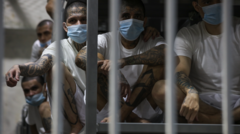In a bold move, El Salvador's President Nayib Bukele has proposed a prisoner swap with Venezuela, stirring international dialogue on human rights and legal processes.
El Salvador Proposes Controversial Prisoner Swap with Venezuela

El Salvador Proposes Controversial Prisoner Swap with Venezuela
El Salvador's president seeks a humanitarian agreement to exchange deported Venezuelans for political prisoners.
President Nayib Bukele of El Salvador has put forward a proposal to repatriate 252 Venezuelans currently incarcerated in his country in exchange for the release of an equal number of political prisoners held by the Venezuelan government. This announcement came via social media, where Bukele directly addressed Venezuelan President Nicolás Maduro, emphasizing the serious charges against many deportees, including allegations of "rape and murder." In contrast, Bukele characterized Venezuela's political prisoners as individuals imprisoned for opposing Maduro's government, which has faced accusations of authoritarianism following its controversial re-election last year.
In response, Tarek William Saab, Venezuela's chief prosecutor, challenged Bukele's claims by inquiring about the specifics of the crimes attributed to the deportees, their judicial proceedings, and access to legal representation. The Venezuelan administration maintains that no political prisoners exist, a stance that is widely contested by human rights organizations.
Bukele highlighted in his social media post his desire for a "humanitarian agreement" and also noted the presence of other nationalities, including U.S. citizens, among the imprisoned. Recent reports indicate that over 200 Venezuelans have been deported from the U.S. to El Salvador, many of whom are alleged members of the Tren de Aragua criminal organization, leading to a complex interplay of international policies regarding immigration and criminal justice.
The U.S. government's financial support to El Salvador for holding these deportees stems from a broader push under the Trump administration's staunch anti-gang strategies. However, the deportation program has been met with legal challenges in the U.S., including a recent Supreme Court ruling that paused deportations of suspected Venezuelan gang members, which the Biden administration has dismissed as "meritless litigation."
As the conversation continues around human rights, sovereignty, and legal fairness, both Bukele's controversial proposal and Maduro's response highlight the contentious geopolitical landscape shaping relations between the U.S., El Salvador, and Venezuela.


















